COUNT
Nearly 2 in 10 in APAC embrace digital payments during pandemic
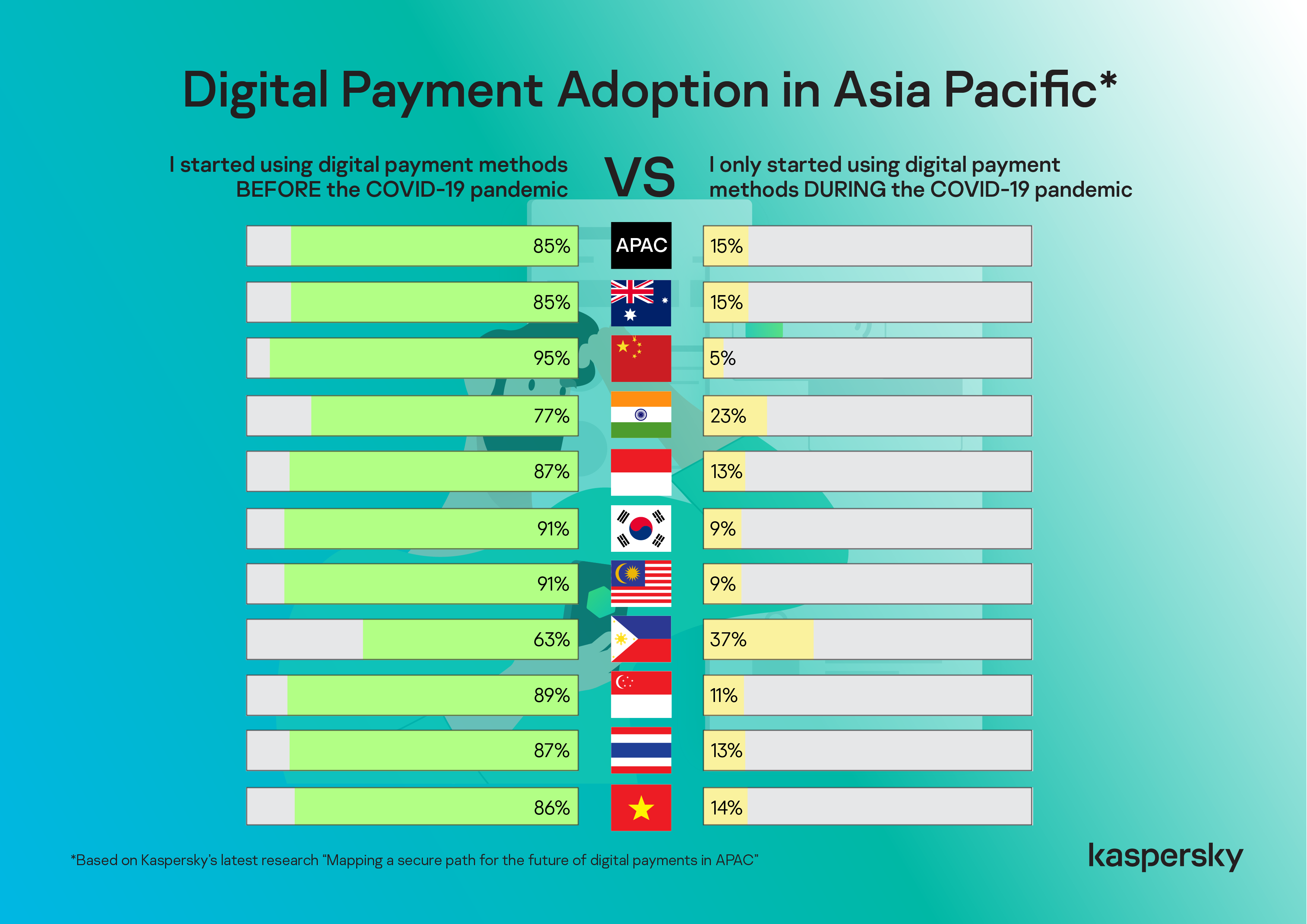
IS cash still king in the Asia Pacific?Kaspersky’s recent study showed it still is, but may not be for long.Titled “Mapping a secure path for the future of digital payments in APAC”, the research studied local users’ interactions with the available online payments in the region and examined their attitudes towards them, which hold the key to understanding the factors that will further drive or stem the adoption of this technology.One of its key findings showed that a great majority (90%) of the Asian respondents has used mobile payment apps at least once in the past 12 months, confirming the fintech boom in the region. Nearly 2 in 10 (15%) of which only started using these platforms after the pandemic.The Philippines logged the highest percent of new e-cash adopters at 37%, followed by India (23%), Australia (15%), Vietnam (14%), Indonesia (13%), and Thailand (13%). The lowest number of first-time online payment users are China (5%), South Korea (9%), and Malaysia (9%).China has been a notable leader in mobile payments in APAC. Even before the pandemic, its top local platforms, Alipay and WeChat Pay, have witnessed significant mass adoption and served as an example to follow for other Asian countries.“Data from our fresh research showed that cash is still king, at least for now, in APAC with 70% of the respondents still using physical notes for their day-to-day transactions. However, mobile payment and mobile banking applications are not far behind with 58% and 52% users utilizing these platforms at least once a week up to more than once a day for their finance-related tasks. From these solid statistics, we can infer that the pandemic has triggered more people to dip their toes into the digital economy, which may fully dethrone cash use here in the next three to five years,” says Chris Connell, Managing Director for Asia Pacific at Kaspersky.Safety and convenience triggered more users in APAC to embrace financial technologies. More than half of the survey pollees noted that they started using digital payment methods during the pandemic as it is safer and more convenient than making a face-to-face transaction.
Respondents also cited that these platforms allowed them to make payments while adhering to social distancing (45%) and that these are the only way they can do monetary transactions during the lockdown (36%). For 29% of users, digital gateways are more secure now compared to pre-COVID-19 era and the same percentage also appreciate the incentives and rewards providers offer.
While only a small fraction, friends and relatives (23%) still influenced new adopters as well as the local government (18%) promoting the use of digital payment methods.
When asked about their reservations prior to using mobile banking and payment apps, first-time users admitted their fears – afraid of losing money online (48%) and afraid of storing their financial data online (41%). Almost 4 in 10 also revealed they do not trust the security of these platforms.
More than a quarter also find this technology too troublesome and requires many passwords or questions (26%), while 25% confessed their personal devices are not secure enough.
“To drive a secured digital economy forward, it is important for us to know the pain points of our users and identify the loopholes that we need to address urgently. It is a welcome finding that the public is aware of the risks that comes with online transactions and because of this, developers and providers of mobile payment applications should now look into the cybersecurity gaps in each stage of the payment process and implement security features, or even a secure-by-design approach to fully gain the trust of the future and existing digital payment adopters,” Connell adds.
To help users in APAC embrace digital payment technologies securely, Kaspersky experts suggest the following:
It is better to be safe than sorry – beware of fake communications, and adopt a cautious stance when it comes to handing over sensitive information. Do not readily share private or confidential information online, especially when it comes to requests for your financial information and payment details.
Use your own computer and Internet connection when making payments online. As like how you would only make purchases only from trusted stores when shopping physically, translate the same caution to when making payments online – you’ll never know if public computers have spyware running on them recording everything you type on the keyboards, or if your public Internet connection has been intercepted by criminals waiting to launch an attack.
Don’t share your passwords, PIN numbers or one-time passwords (OTPs) with family or friends. While it may seem convenient, or a good idea, these provide an entryway for cybercriminals to trick users into revealing personal information to collect bank credentials. Keep them to yourself and safeguard your private information.
Adopting a holistic solution of security products and practical steps can minimize the risk of falling victim to threats and keeping your financial information safe. Utilize reliable security solutions for comprehensive protection from a wide range of threats, such as Kaspersky Internet Security, Kaspersky Fraud Prevention and the use of Kaspersky Safe Money to help check the authenticity of websites of banks, payment systems and online stores you visit, as well as establish a secure connection.
To read the full report, please visit https://kas.pr/b6w8.
Methodology
The Kaspersky “Mapping a digitally secure path for the future of payments in APAC” report studies our interactions with online payments. It also examines our attitudes towards them, which hold the key to understanding the factors that will further drive or stem the adoption of this technology.The study was conducted by research agency YouGov in key territories in APAC, including Australia, China, India, Indonesia, Malaysia, Philippines, Singapore, South Korea, Thailand and Vietnam (10 countries). Survey responses were gathered in July 2021 with a total of 1,618 respondents surveyed across the stated countries.
The respondents ranged from 18-65 years of age, all of which are working professionals who are digital payment users.
Through this study, when the behavior of the population of a market is generalized, it is in reference to the group of respondents sampled above.
COUNT
Isambard-AI, the UK’s most powerful AI supercomputer, goes live
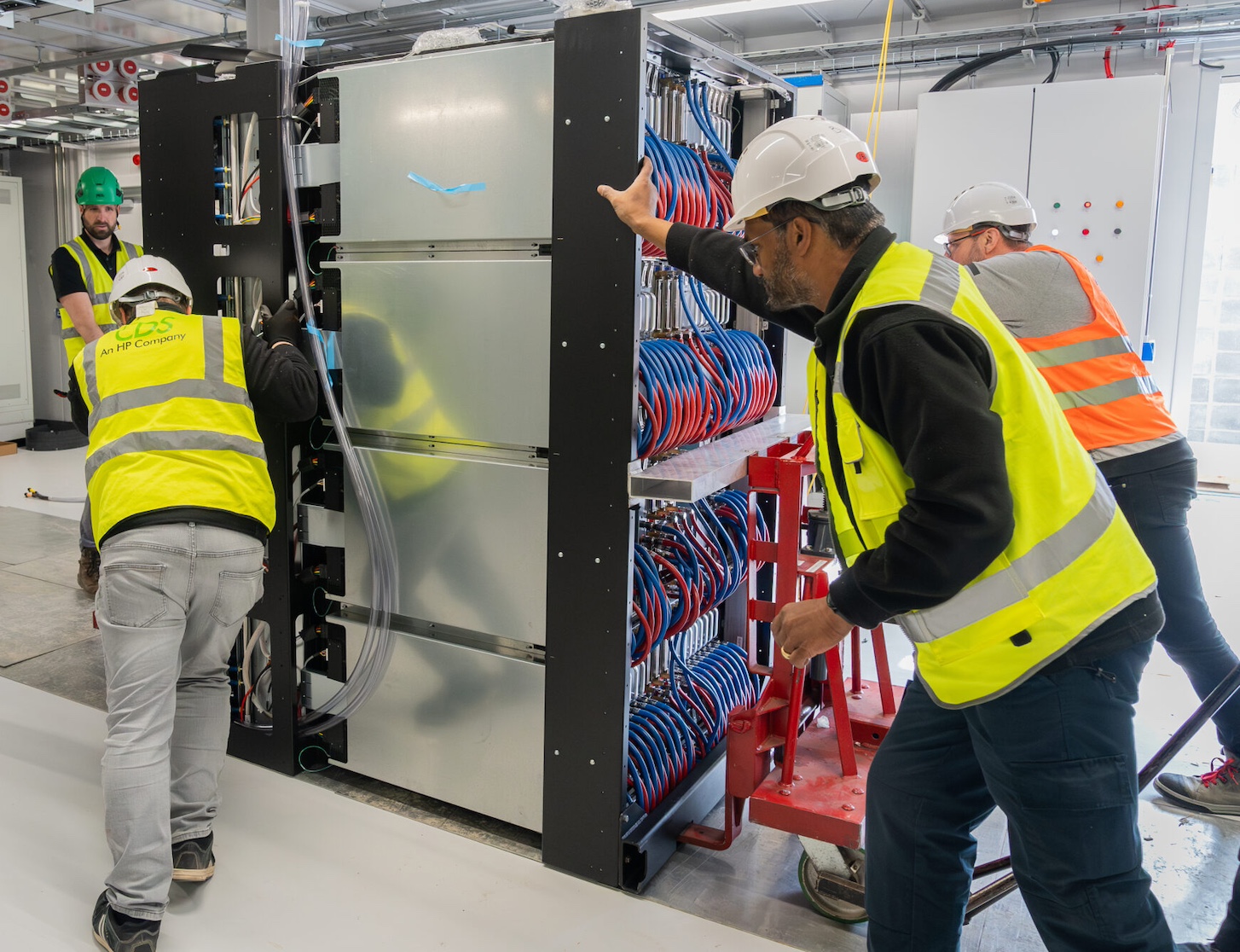
6:39 p.m. July 18, 2025
(NVIDIA PR) The U.K. has officially joined the premier league of global AI infrastructure — and it’s not starting small.
At a ribbon-cutting ceremony at the Bristol Centre for Supercomputing (BriCS), leaders today unveiled Isambard-AI, the most powerful AI supercomputer ever built in the U.K.
U.K. Secretary of State Peter Kyle was joined by leaders from across academia, industry and government, including Simon McIntosh-Smith, director of the Bristol Centre for Supercomputing, and Neil MacDonald, executive vice president and general manager for Hewlett Packard Enterprise’s server business.
“And as we press this switch to activate the UK’s most powerful supercomputer, we are embarking on Britain’s super future where AI contributes towards the delivery of better public services, greater public prosperity, deeper scientific discovery and stronger national security,” Kyle said.
The numbers back up Kyle’s statement:
- 21 exaflops of AI performance
- 5,448 NVIDIA GH200 Grace Hopper Superchips
- Set to rank 11th worldwide on the latest TOP500 list of world’s fastest supercomputers
- More than 10x faster than the next-fastest supercomputer in the U.K. More computing power than all other U.K. supercomputers combined
- Ranked fourth globally for energy efficiency
Engineering teams working collaboratively to maneuver and install components within the supercomputer’s data hall, illustrating the complex and coordinated effort behind the build.
Why It Matters
Isambard-AI gives U.K. researchers and businesses a once-in-a-generation leap in computing power. It’s a platform to accelerate breakthroughs in:
- AI-driven drug discovery
- Advanced climate modeling
- Materials science
- Large language models (LLMs) tuned to U.K. languages and laws
Backed by £225 million in government investment and built with NVIDIA, HPE, the University of Bristol and others, Isambard-AI signals a clear ambition: to lead in AI, the U.K. must lead in compute.
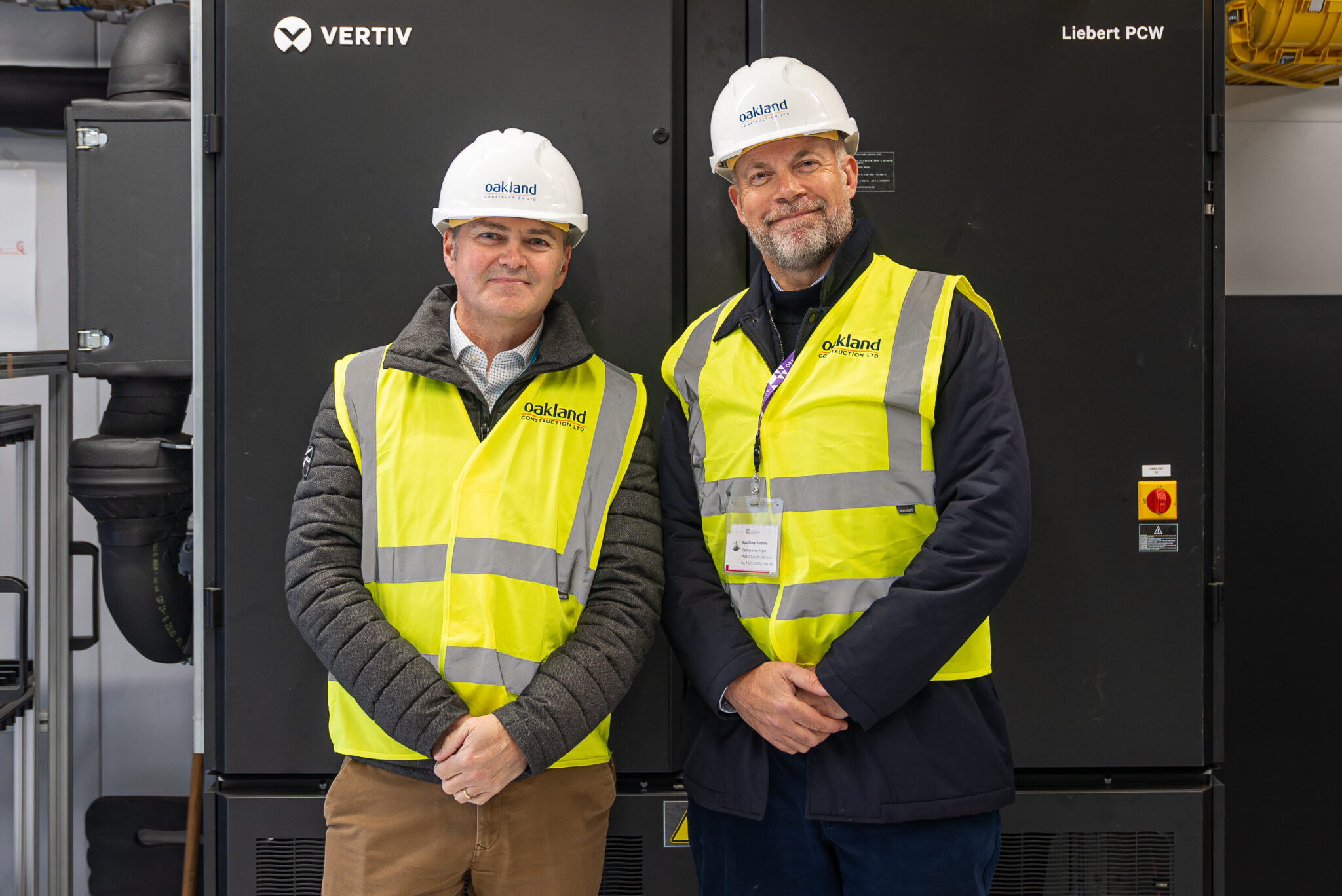 Simon McIntosh-Smith, director of the Bristol Centre for Supercomputing, with Simon Appleby, AI business lead at HPE.
Simon McIntosh-Smith, director of the Bristol Centre for Supercomputing, with Simon Appleby, AI business lead at HPE.
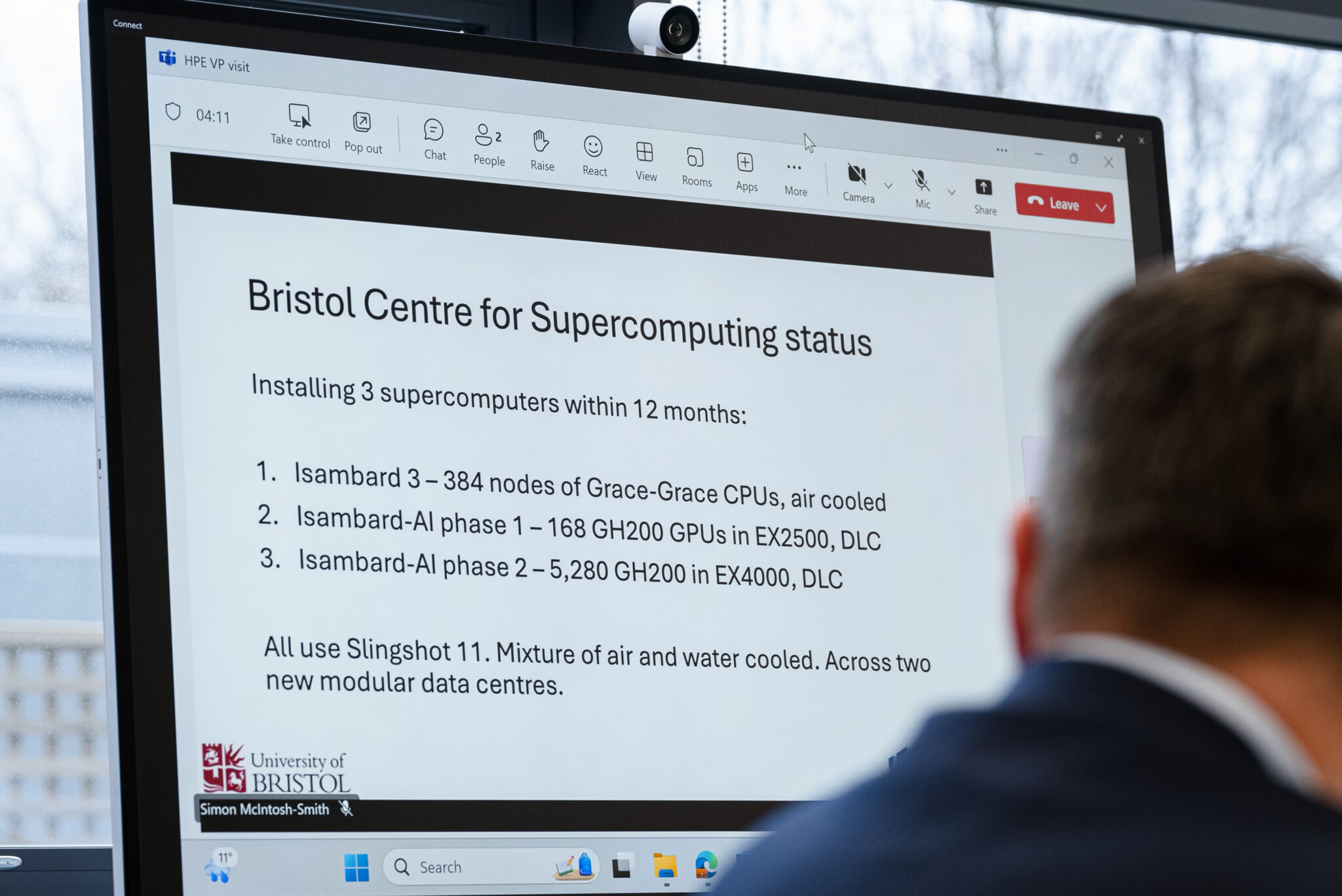 A glimpse into the project’s strategic planning, showing a screen outlining the ambitious goal of installing multiple supercomputers, including Isambard-AI’s phases, within 12 months.
A glimpse into the project’s strategic planning, showing a screen outlining the ambitious goal of installing multiple supercomputers, including Isambard-AI’s phases, within 12 months.
A Turning Point for UK Science
Named after Isambard Kingdom Brunel — the 19th-century engineer who reshaped Britain with railways, bridges and ships — Isambard-AI brings that same scale of ambition to AI research.
And like Brunel’s projects during his era, it moves fast. Having gone from conception to deployment in just under two years, including the construction of the modular data center in 48 hours, the supercomputer is already running live projects aligned with national priorities.
Early flagship projects include:
- Nightingale AI: A sovereign, multimodal health foundation model trained on National Health Service (NHS) data to support earlier diagnoses and personalized care.
- BritLLM: A U.K.-developed LLM project supporting British languages like Welsh, alongside English, to promote inclusivity and better public service delivery in healthcare, education and public services.
- UCL Cancer Screening AI: Developing the first scalable AI system for prostate cancer detection via MRI, aiming for faster diagnoses and tailored treatments.
- EIMCRYSTAL (University of Liverpool): Using AI to search 68 million chemical combinations to discover greener, more sustainable industrial materials — reducing reliance on rare or toxic inputs.
- EgoAI (University of Bristol): Using AI to analyze recordings from wearable cameras and other smart devices to help people perform tasks better at home. This holds immense promise for assisting dementia patients in the future.
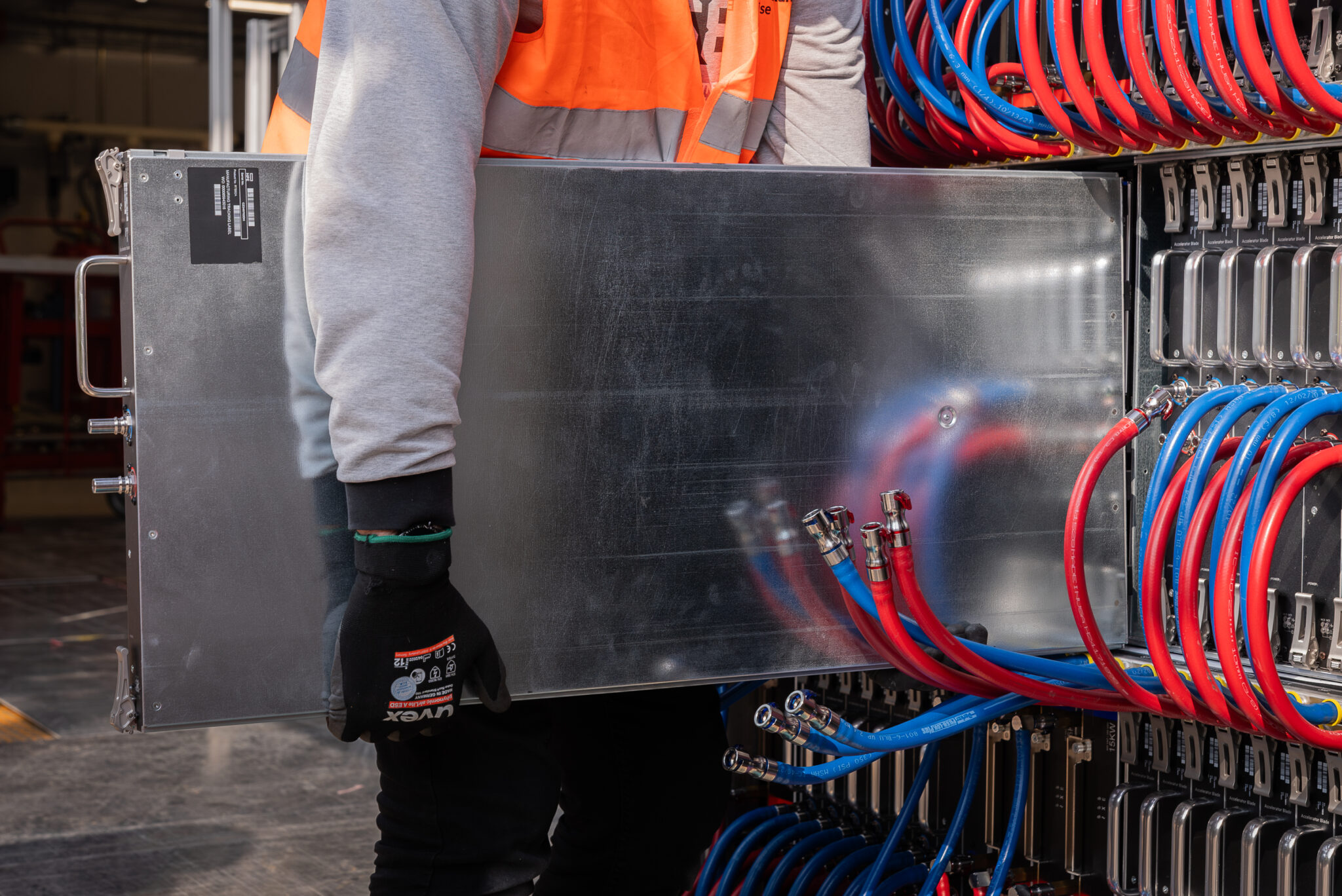
A technician carefully installs a server blade equipped with direct liquid cooling, demonstrating the hands-on precision involved in assembling Isambard-AI’s advanced computing infrastructure.
Built Fast, Built Smart
How do you build a supercomputer in half the usual time?
“We treated the project like a high-performance processor,” said Simon McIntosh-Smith, director at BriCS. “We executed everything in parallel.”
Key to this speed:
- Parallelized project management
- Early procurement of critical hardware, particularly GPUs
- Prefabricated modular data halls shipped in and assembled in days
- Relentless optimization of delivery timelines
- Ground broke in June 2024. By June 2025, the full 5-megawatt system was live: built, tested and running at a global scale.
COUNT
Smart launches revamped Online Store, rolls out Postpaid Plan 799

9:43 p.m. July 7, 2025
Mobile services provider Smart Communications, Inc. (Smart) is making it simpler and faster for more Filipinos to elevate their digital lifestyle with the launch of its revamped Smart Online Store (https://store.smart.com.ph/), a portal where new and existing customers can conveniently explore and securely avail of the latest prepaid and postpaid offers with just a few taps on their smartphone or computer.
As a special introductory offer, the revamped Smart Online Store is the launch platform for Smart Postpaid Plan 799, a SIM-Only Plan that comes with 15 GB open-access data for all sites and apps, 100 GB of 5G data for six months for use in Smart 5G-covered areas, Unlimited Calls and Texts with Landline Calls, and a complimentary Netflix Mobile subscription.
As an added perk for subscribers who will subscribe to the new Smart Postpaid Plan 799, applications made through the Smart Online Store will receive 50% more open access data (7.5 GB) for the first six months.
Easily sign up for a Smart Postpaid Plan 799
New and existing subscribers can conveniently sign up for Smart Postpaid Plan 799 by simply going to https://store.smart.com.ph/ (https://store.smart.com.ph/), selecting “SIM-Only Plans,” and then choosing “Plan 799.”
Customers must then fill out the required personal information to complete their online application.
Initially available only on the Smart Online Store, Smart Postpaid Plan 799 will also be offered to all Smart Stores nationwide soon.
Value-packed offers at your fingertips
Aside from enabling subscribers to avail of Smart Postpaid Plan 799 with just a few clicks, the Smart Online Store also allows customers to bundle a device with their SIM-Only Plan.
Moreover, Smart Online Store’s intuitively designed portal makes it so much easier for customers to discover other value-packed products and services that suit their lifestyle – from data, call, and text offers, SIMs and eSIMs, to the latest smartphones.
The portal also allows users to reload for credits, avail of limited promos, purchase phones bundled with Smart and TNT SIM cards, buy devices under Smart Bro 5G promos, and order Smart and TNT SIM packages.
Lastly, customers can enjoy a wide range of payment options with priority handling for select credit cards.
The revamped Smart Online Store is just one of the many ways that make Smart simply reliable for Filipino mobile users looking to level up their digital lifestyle and enjoy the many benefits of technology.
Visit the Smart Online Store and sign up for a Smart Postpaid Plan 799 now at https://store.smart.com.ph/.#
COUNT
Mega Sardines: 50 years of serving nutrient-rich meals, primed to go global

10:22 a.m. June 20, 2025
As it celebrates its 50th anniversary, Mega Prime Foods Inc. reflects on a remarkable journey—one that began with a simple mission to provide affordable, nutritious food to Filipino families.
What started as a humble fishing company has now become one of the most innovative and socially driven food manufacturers in Southeast Asia, producing over 3 million cans of sardines daily from its advanced facilities in Batangas and Zamboanga.
Sardines, long a staple in Filipino households, are among the most nutritionally dense foods in the world—rich in Omega-3 fatty acids for brain and heart health, vitamin B12 for metabolic support, and a host of other essential nutrients like calcium, iron, and selenium. Mega Sardines ensures these health benefits are preserved through its industry-leading “catch to can in 12 hours” process—setting it apart in freshness, quality, and care.
For Chairman and Founder William Tiu Lim, the journey has not been easy. From natural disasters like the devastating 1970s typhoon that destroyed much of their fishing fleet, to political and economic crises, Mega has endured and grown stronger. Through it all, Tiu Lim held fast to three core values: Quality, Innovation, and Malasakit—a uniquely Filipino term meaning selfless concern for others.
“We’ve always aimed for the best possible quality,” said Tiu Lim. “Our fish go from sea to can in just 12 hours, compared to the industry’s usual 1–3 days. That freshness is our edge.”
This commitment to innovation and excellence recently culminated in a global milestone: Mega Sardines was designated a “Superfood” by the Medical Wellness Association (MWA), becoming the first seafood product ever to receive the distinction. The recognition was awarded during Mega’s 50th anniversary celebration by MWA Board Member and faculty member James Michael Lafferty, underscoring the brand’s role in promoting global wellness.
“I was honored to announce Mega Sardines as the world’s first seafood Superfood,” said Lafferty. “It’s a testament to their quality, innovation, and mission to improve health outcomes.”
As the company transitions into its second generation of leadership under President and CEO Michelle Tiu Lim-Chan, the vision for global expansion is clear—but rooted in the same human values that built the brand.
“We are people-first,” said Lim-Chan. “We serve our customers, support our employees, and provide opportunities to improve lives. Growth is not just about geography—it’s about purpose.”
Mega Prime Foods is already expanding its product lines, offering not only sardines but also tuna, mackerel, fruit cocktails, coconut gel, Primo non-alcoholic sparkling juices, and the Jimm’s Coffee functional beverage line.
“Our proudest achievement is our ability to turn compassion into tangible, quality products,” Lim-Chan added. “We are not done yet. The next 50 years will be even more exciting.”









